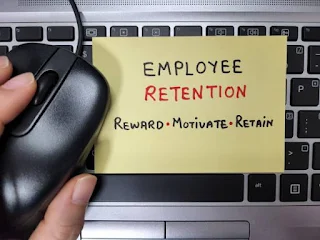Employee retention has never been harder. During the COVID-19 pandemic, millions of workers left full-time jobs, started new businesses or took sabbaticals - creating even greater difficulty for employers and HR personnel alike.
Many have come to recognize that their career or industry no longer fits with their quality-of-life goals, prompting many companies to offer additional perks as an attempt at retention - but even this effort has fallen short.
1. Create a Culture of Recognition
Recognition is vitally important, both to employees whose work contributes to larger company goals and KPIs, and those whose performance goes unrecognized in departments or roles that don't typically receive the limelight. By creating a culture of recognition, employees feel more motivated and valued while being less likely to seek other work that fulfills their needs and aspirations elsewhere.
Experts of workplace psychology believe employees experienced what has been termed the "Great Self-Evaluation." After reviewing their lives and careers, employees realized they desired more from their jobs - leading to a shift in workforce priorities towards meaningful work with more challenging projects that offer increased satisfaction in careers.
This trend has had an impact across industries and sizes of companies; apparel retailers for instance lost employees at three times the rate of airlines and medical device makers. Though industry may explain some variation in employee retention rates, other factors also contribute to employee retention; for instance perceptions of company values, opportunities for advancement, perceived fair pay for performance etc. Companies with higher employee retention can more readily attract talent when hiring markets are tight.
2. Create a Culture of Accountability
During the pandemic, there was a dramatic shift in work-life perspectives, leading many employees to realize that their jobs no longer fulfilled them - leading them to quit in what has come to be known as The Great Resignation or Turnover Tsunami.
Studies indicate various reasons for this mass exodus, such as poor work-life balance and exploitative conditions, changes in life circumstances or simply feeling powerless in their roles. Whatever their origin may be, employee departures have placed considerable strain on companies struggling to replace lost talent.
Instead of trying to address this problem by increasing compensation or other incentives, leaders must create a culture of accountability. Listening and responding to employee concerns are vital elements in creating an appealing workplace in this new age; workers today look for meaningful work with transparency, fairness, and healthy cultures rather than just paychecks; getting this right is the key to employee retention in an age of resignation; talent acquisition teams, managers with direct reports, and HR staff should strive towards this goal as part of employee retention strategies.
3. Create a Culture of Collaboration
No matter the name you give it, America is witnessing record employee turnover rates - something many companies are facing due to losing staff that compromise productivity, morale and engagement and cost them two times their annual salary in replacement expenses. This issue poses major headaches for organizations.
According to workplace experts, this unprecedented wave of resignations is also driven by many career professionals taking an introspective look at their goals, priorities, and interests, in order to identify what's most important going forward. Accordingly, they may be driving this unprecedented resignation wave themselves.
As it's important to recognize, reports about the Great Resignation offer only an overall impression of its impact, rather than specific details relevant to your company, it would be prudent for leaders to focus on improving areas that best align with their business environment and workforce demographics. Here are a few steps they could take:
4. Create a Culture of Learning
No matter the name given it, this pandemic has had one result that's clear: employees have taken this as a wake-up call and altered their priorities accordingly, including reevaluating the value of their jobs and work/life balance issues. Many no longer see themselves returning to companies who treat employees like disposable assets.
Establishing a culture of learning and development is essential to increasing employee retention. Not only is it a key driver of productivity and innovation, it has proven twice as predictive as compensation when it comes to employee loyalty.
Fostering a culture of psychological safety, by offering tools and policies tailored towards people's wellbeing at work. Flexible work arrangements can also be very useful as they allow employees to manage both responsibilities and personal lives while remaining productive at the office. Finally, effective leadership coupled with trustful relationships is another strong component of employee retention; developing this capability through training for leaders is definitely worth your while!
5. Create a Culture of Engagement
Though the pandemic has passed, employee turnover rates remain alarmingly high. Organizations must employ employee retention strategies in order to retain employees for as long as possible.
Although having an effective compensation strategy is certainly essential to employee retention, other aspects must also be taken into account. Research has revealed that pay is often not the top reason people leave their jobs; in fact, pay ranks 16th on a list of major employee dissatisfiers.
Make it your mission to cultivate an employee-centric environment by offering attractive employee perks such as flexible work schedules and learning and development opportunities. When employees feel that their employer puts them first, they're much more likely to stay put at work. You should also recognize and promote top performers regardless of race, gender, age or other demographic characteristics - this creates an inclusive culture that boosts employee morale while strengthening loyalty to your company.






.jpg)

No comments:
Post a Comment